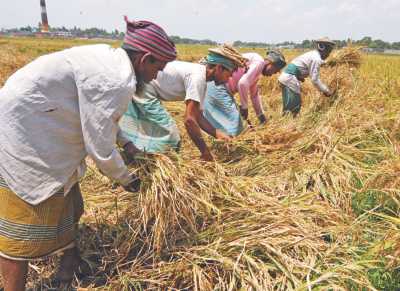Food import dips by half, govt saves $1b on bills
 A bumper output of rice has eased pressure on import.
A bumper output of rice has eased pressure on import.
Food grain imports have fallen by 56 percent in the current fiscal year, cutting the country's import bills by $1 billion, thanks to a rise in production of rice at home.
Rice and wheat imports slumped to 2.24 million tonnes between July and mid-June of the outgoing fiscal year, from 5.15 million tonnes in the July-June period a year ago, according to food ministry data.
During July to June 9 of the outgoing fiscal year, import payments for rice and wheat fell by $1.02 billion or 55 percent from $1.87 billion during the same period a year ago, according to Bangladesh Bank data.
The drastic fall in imports provides much relief to the policymakers at a time when export growth slows but the pressure on the balance of payments remains high due mainly to import of fuel to generate electricity through 'quick rental' power plants.
"The dip in food imports has helped curb a further depreciation of the taka," said economist Mahabub Hossain, attributing the reduced import to a rising rice output.
Rice yield rose by around 1 percent to 33.73 million tonnes in the current fiscal year from 33.54 million tonnes the previous year, enabling Bangladesh to become almost self-sufficient in its staple food, thanks to favourable weather, availability of fertiliser and its balanced use.
The reduced import of food grain has saved a good amount of subsidy, which the government can use in the power sector, said Hossain, who follows agriculture and rural economy.
"If the subsidy for food was needed, the government had to borrow more funds, which might make the economic situation of the country worse," said Hossain, also executive director of BRAC, a development organisation.
So, the condition of economy remains better because of the fall in food grain imports, he said.
He said import requirement for food for the next fiscal year would not be high unless there is any natural disaster.
Food and Disaster Management Minister Muhammad Abdur Razzaque said the government did not open fresh letter of credit (LCs) to import rice in the current fiscal year.
"We took delivery of rice against the contracts we signed the previous fiscal year," he said.
Razzaque said rice is in surplus now because of higher production in the past three harvests.
The government will review the overall production and stocks situation in November based on the production outlook of rain-fed aman rice, he said.
"We may need to export if we have surplus at that time," said Razzaque, explaining that export might be required to help prices of rice increase from the current low level to encourage farmers to stay with the cultivation of the crop.
A lack of space in public warehouses is another factor, said the minister, adding that import requirement for food grain would not be high the next fiscal year, beginning in July.
The government has cut its target for importing food grains by 15.4 percent to 1.1 million tonnes for the next fiscal year. Of the amount, wheat and rice import has been planned at 0.8 million tonnes and 0.3 million tonnes respectively, according to budget documents.
Till mid-June of the outgoing fiscal year, the government's imports fell by 52 percent to 1.01 million tonnes from 2.12 million tonnes the same period a year ago.
However, imports of wheat by the private sector may rise the next fiscal year, said Abul Bashar Chowdhury, chairman of BSM Group, a Chittagong-based commodity importer.
Including the government's planned wheat import, the total imports of the grain may rise to 2.3 million tonnes the next fiscal year from nearly 1.9 million in the outgoing year, said Chowdhury.
The Daily Star/Bangladesh/ 28th June 2012
Other Posts
- IBBL opens branch in Kurigram
- Al-Arafah Bank opens branch in Pabna
- Prime Cash launched at Singer Plus
- Bank of Spain says recession deepens in second quarter
- Robi-Jamuna Bank deal on mobile remittance
- DBBL, Asiatic sign mobile salary payment deal
- RAKUB executive wins gold medal
- Apparel makers seek exemption from BB's new loan rules
- Shahjalal Islami Bank re-elects top brass
- Stocks continue to rise Turnover on Dhaka bourse goes up 71pc
- Don’t tighten term-loan rules Apparel industry leaders urge BB
- HSBC selling stakes in Axis Bank, Yes Bank




Comments